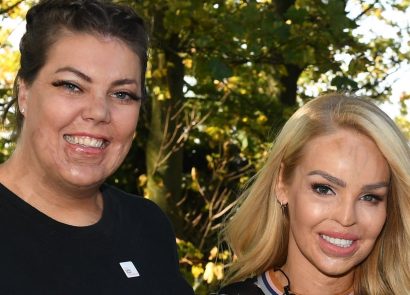Do you tend to put on a brave face for the people around you? Us too! Showing your vulnerability can be one of the most courageous acts of all. H&W investigates
Confession time: if there’s one thing I’m bad at, it’s setting skyscraper-high expectations of myself. A good example of this when I gave myself a month to learn German before a trip to Cologne. By the time my trip came around, I could confidently ask for a basket of bread, and that was about it – and to save confusion about the complexity of that sentence, bread, in German, is ‘brot’. For me, vulnerability is when I have to admit that I can’t do something. Whether that means I have to tell my editor that I can’t meet a deadline at work, or I have to ask for my partner’s help when constructing furniture, I would rather do it all, and stagger under the weight of the heavy expectations I place on myself than simply say, “I don’t think I can do that.” Being honest about your capacity level is hard, particularly if it makes you feel exposed. However, marketers and researchers are fascinated by the positive repercussions that come with it. “Vulnerability triggers our self-protection mechanism. It’s that feeling of being rejected,” says Jivan Dempsey, psychologist and life coach (jivandempsey.com). “But the practical side of vulnerability is being your authentic self, which gives birth to empathy and trust.” Still not convinced? Here’s our cheat-sheet on how you can use vulnerability to create stronger connections and improve your confidence, too.
Share the spark
Not feeling enthused to share your idea in a meeting? Often, the best creative ideas come from the thoughts that you’d rather keep close. Shame researcher Brené Brown’s famous TED Talk,‘The Power of Vulnerability’ has amassed 42,223,591 views. In her book, Daring Greatly, Brown (a self-confessed perfectionist), explains that vulnerability comes with the courage to be imperfect: “When we spend our lives waiting until we’re bulletproof before we walk into the arena, we sacrifice relationships and opportunities.” It’s the emotions that we try the hardest to conceal – such as fear, heartache or sadness – that have the most meaningful impact. But too often, as Brown says, it’s our fear of what people will think of our imperfections that prevents us from opening up. The researcher advises writing a list of the people in your life whose opinions actually matter. Her own list has eight names on it and she suggests including only the people who love you because of your imperfections. That way, when you have your next spark of creativity in the shower, you won’t be hung up on thinking how to perfect it, rather, how you should go after it.
All in this together
Raise your hand if you’d told your boss that everything was fine, when you actually clocked off at 9pm, and impending deadlines seem to be etched into your eyelids? Everybody wants to look competent in the office, but a workplace culture where there is sometimes no room for vulnerability can shut a business off to innovation. “Work cultures are beginning to change,” says Jivan. ‘The ‘stiff upper lip’ bravado is shifting and people are realising that, particularly when it comes to creativity, vulnerability can be really beneficial to businesses.” If you manage people, being vulnerable can also open up a better dialogue within your team. “A softer side means you gain a lot more respect and managers become better leaders because their colleagues admire them. It’s about creating that sense of fellowship.”
Creating that click
We often have an idea in our head of what we’d like other people to perceive us as (we all know that person who likes to talk about how early they hit the gym), but the key to creating a connection is to show authenticity, as Jivan explains. “People are intuitive and know when you’re putting on a front.” That doesn’t mean asking someone about their previous relationships before you’ve shaken their hand – it means being open, while respecting boundaries. “Not everyone will want to be vulnerable at the beginning of a friendship, but if you’re your authentic self then you can create a deeper and more honest relationship with that person.” Often, we go into adult interactions guarded, but it’s the gut responses that help us to express vulnerability. These feelings of understanding can lead to deeper bonds. The takeaway? There’s bravery in being soft.
Be the imperfect parent
Got kids? Being able to show vulnerability as a parent can mean that our children become more emotionally intelligent and less worried about making a mistake, or ‘messing up’. “Family dynamics can impact your willingness to be vulnerable and authentic,” explains Jivan. “If you hear messages that you’re not good enough and there are certain expectations and high-standards that you had to live up to, then that can make you feel that you can’t talk openly.” Every parent wants to have a relationship with their child where they feel comfortable talking about what’s worrying them. This means stepping off the perfect, all-knowing adult platform. As Brené Brown explains: “Imperfect parenting moments turn into gifts, as our children watch us try to figure out what went wrong, and how we can do better next time.”
Heart to heart
Pulling up your pal on why she always seems to bail on plans last-minute might feel like a convo you’d rather avoid, but a huge part of having tricky conversations is going in with a plan of action. If you know what’s going to be talked about, then you can think of how you can respond prior to the talk happening. But if you’re flying by the seat of your pants, then those difficult discussions can become a cause for panic. “Don’t shy away from those,” says Jivan. “Mentally preparing yourself and being honest is what matters here. Try to avoid directing the blame and instead, offer an olive branch. Yes, you’ll be the one in the vulnerable position, so there does need to be a degree of confidence and the ability to pick yourself up again if you do get rejected or judged, but you will always have better relationships if you take that stance of being vulnerable and showing empathy.




















